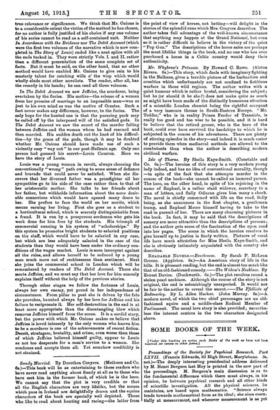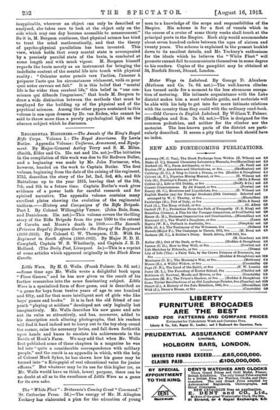SOME BOOKS OF THE WEEK.
[Dudes this heading we notice such Books of the week as hare not keen teemed for review is other forms.) Proceedings of the Society for Psychical Research. Part LX VII. (Francis Edwards, 83 High Street, Marylehone. 3s. net.)—The deeply interesting presidential address delivered by M. Henri Bergson last May is printed in the new part of the proceedings. M. Bergson's main discussion is as to the fundamental difference which there must always, in his opinion, be between psychical research and all other kinds of scientific investigation. All the physical sciences, he maintains, are based upon mathematics. "Science always tends towards mathematical form as its ideal; she aims essen- tially at measurement, and wherever measurement is as yet
inapplicable, wherever an object can only be described or analysed, she takes care to look at the object only on the side which may one day become accessible to measurement." So it is, M. Bergson continues, that physical science has tried to treat the mind mathematically, and that the theory of psycho-physical parallelism has been invented. This view, which holds that every mental state is accompanied by a precisely parallel state of the brain, is combated at some length and with much vigour. M. Bergson himself regards the brain merely as an instrument for bringing the indefinite content of the mental life into touch with physical reality : " Orienter notre pensee vers l'action, l'amener preparer l'acte que les circonstances reclament, voila ce pour quoi notre cerveau est fait." It is this belief that "mental life is far wider than cerebral life," this belief in "une con- science qui deborde l'organisme," that leads M. Bergson to draw a wide distinction between the methods that must be employed for the building up of the physical and of the psychical sciences. Among the other papers contained in this volume is one upon dreams by Dr. van Eeden, who cannot be said to throw more than a purely psychological light on the obscure subject which he discusses.



































 Previous page
Previous page